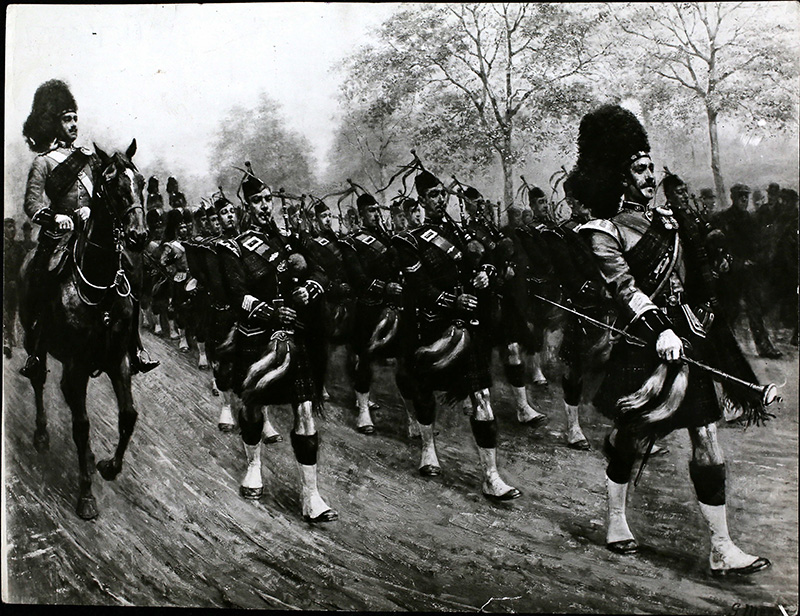There is a long history of Bagpipes and the British Army, and whilst they weren’t officially recognised until 1854, much of the Army’s battles since the mid-1700s had been fought with piper’s playing. The original purpose of the pipes in battle was to signal tactical movements to the troops during battle.
By the time of WWI it was not only the Scottish, or even British Regiments that had pipe bands, with Commonwealth countries such as Canada, Australia or even South Africa having regiments with their own Pipers. The bag pipes importance in linking the men back to the history of their unit, and of their homeland was not under appreciated. The sound and swirl of the pipes boosted morale amongst the troops and intimidated the enemy. However, unarmed and drawing attention to themselves these extraordinary men were sitting ducks as they went over the top to pipe their men into battle as pipers were always an easy target for the enemy guns.
The pipers of Scotland and overseas regiments should be very proud of the part they have played in the Great War. In the heat of battle and by the lonely grave they have shown tremendous gallantry and bravery, with many falling in the fight for liberty, but their memories will remain.
Forces War Records are pleased to present this now transcribed collection of records for ‘Pipers of Scottish and overseas Regiments during the Great War 1914-18’, as a permanent memorial to the men involved and an invaluable resource for genealogists.
This collection records all of the men who belonged to these pipe bands during the First World War. Apart from their general military information (names, service number, rank, regiment and battalion), this collection notes their fate (if applicable) and a brief outline of how the bands were utilised. Whilst this often states that the band was quickly withdrawn from frontline service – due to their importance with regards to moral, often even no longer being used as stretch bearers. It is quoted that over 1,000 pipers died during WWI
Records in this collection may include the following:
- Surname
- Regimental Number
- First name(s) or initials
- Rank
- Regiment
- Battalion
- Gallantry Awards
- Fate
- Duty Location
- A brief outline of the Bands service
In addition, the record set includes such notable entries as:
Piper Daniel Laidlaw – During the worst of the bombardment, when the attack on German trenches near Loos and Hill 70 on September 26th, 1915, was to commence, Piper Laidlaw, of the 7th Battalion, The King’s Own Scottish Borderers, seeing that his company was somewhat shaken from the effects of gas, mounted the parapet with absolute coolness and disregard of danger, and, marching up and down, played his company out of the trench. The effect of his splendid example was immediate, and his company dashed out to the assault. Piper Laid law continued playing his pipes till he was wounded. For his conspicuous bravery he was awarded the Victoria Cross
Piper McLennan – On July 21st, 1915 a Turkish redoubt was captured at Gallipoli. To great encouragement of the men, Piper K, McLennan, of the 1/7th (Blythswood) Battalion, Highland Light Infantry, advanced with the attacking line, playing the pipes. During the attack a shrapnel shell burst close to him, shattering his pipes, but with great courage and coolness, he began to tend and dress the wounded. His conspicuous gallantry was rewarded with the Distinguished Conduct Medal.
Did your relative serve with the Pipers of Scottish and overseas Regiments during 1914-18? Perhaps he received an award for his bravery or loyal service. Find out NOW.!!

